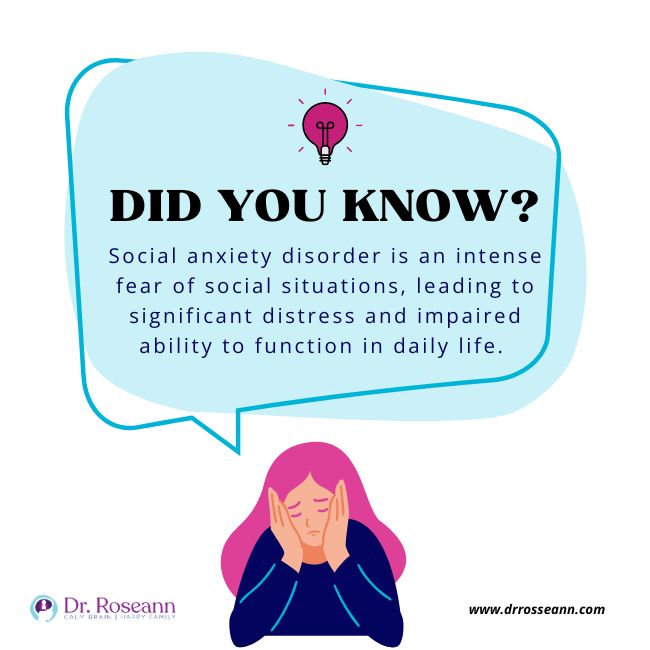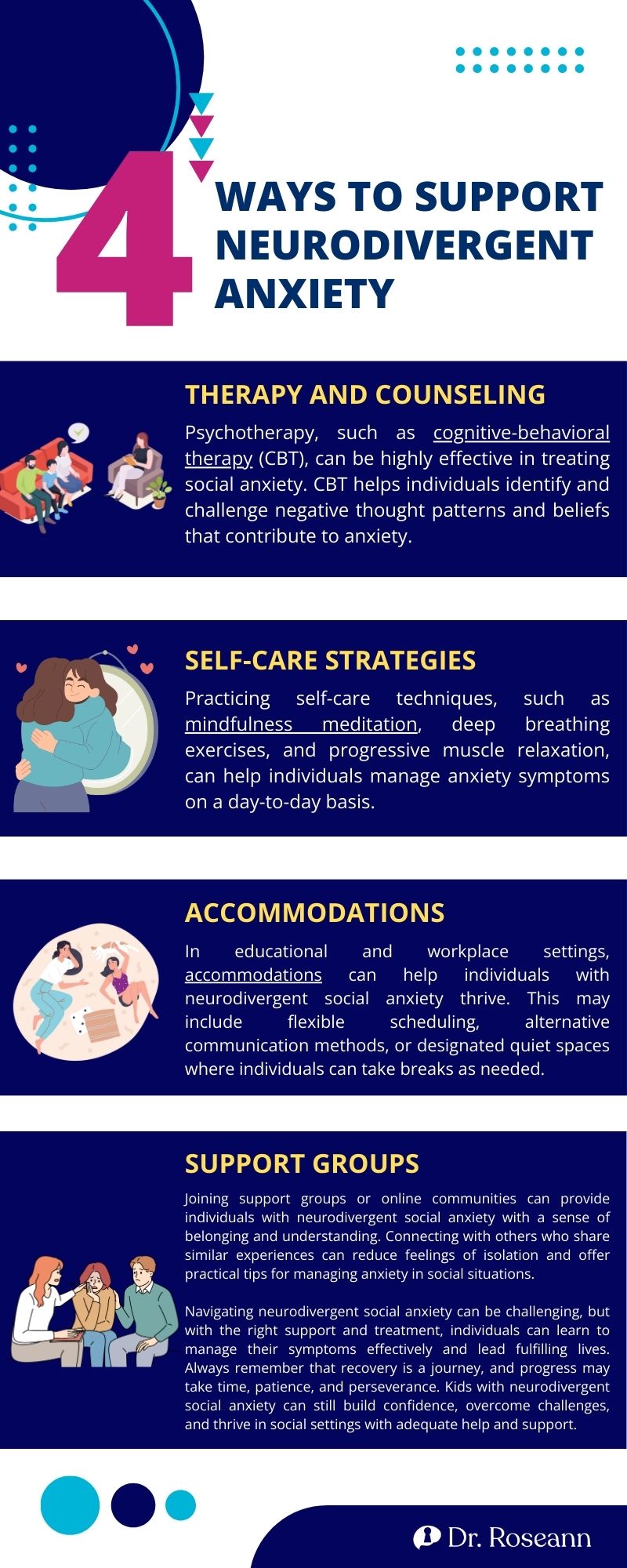In recent years, there has been growing recognition and discussion surrounding neurodiversity, the concept that neurological differences should be recognized and respected as natural variations in the human population.
It has led to questions about whether mental health conditions, particularly social anxiety, fall under the umbrella of neurodiversity. The rise in social anxiety amongst children is something I have witnessed during these three decades that I have helped children and families as a mental health expert.
With such a rise in anxiety disorders, it is logical that some consider it as part of the neurodivergence spectrum.
What is Neurodivergence?
Neurodivergence refers to the natural variation in how individuals think, behave, and process information due to differences in their neurological makeup. It includes conditions such as autism, attention deficit hyperactivity disorder (ADHD), AuDHD, dyslexia, and others. Neurodivergent individuals often experience the world differently from what is considered typical, or neurotypical.
Is Social Anxiety Neurodivergent?
Social anxiety disorders are characterized by excessive worry, fear, and nervousness that can significantly impact daily life. But does having anxiety mean one is neurodivergent? The classification of social anxiety as neurodivergent is a matter of ongoing debate within the field of psychology and neurology.
While some argue social anxiety disorders should be considered neurodivergent due to the differences in brain functioning and neurotransmitter activity associated with these conditions, others maintain that neurodivergence should be reserved for conditions with more pronounced neurological differences, such as autism or ADHD.
Understanding Social Anxiety

Social anxiety disorder is characterized by an intense fear of social situations and interactions, often accompanied by feelings of self-consciousness and inadequacy. Individuals with social anxiety may experience differences in brain functioning and neurotransmitter activity compared to those without these conditions.
These neurological variations could be considered a form of neurodivergence, albeit one that is less commonly recognized compared to conditions like autism or ADHD. However, social anxiety and AuDHD may co-exist, making any person with these conditions neurodivergent.
Debating Neurodiversity and Social Anxiety
Whether anxiety should be considered neurodivergent hinges on how we define neurodiversity. Some argue that neurodivergence should be limited to conditions with clear neurological differences, such as those affecting brain structure or function. Others advocate for a broader understanding of neurodiversity that includes psychological and emotional differences, like those seen in anxiety disorders.
Research has shown that individuals with anxiety disorders may exhibit differences in brain structure and function compared to those without these conditions (Sylvester et al., 2012).
For example, studies using neuroimaging techniques have identified alterations in areas of the brain involved in emotion regulation, such as the amygdala and prefrontal cortex, among individuals with anxiety disorders (Anand & Shekhar, 2006).
Implications and Support for Neurodivergent Anxiety
Recognizing anxiety disorders as neurodivergent could have important implications for how we understand and support individuals with these conditions. It could lead to greater acceptance and accommodation in various settings, including education, employment, and social environments.
Additionally, framing anxiety as a form of neurodiversity could foster empathy and understanding among neurotypical individuals, reducing stigma and promoting inclusivity. By expanding our understanding to include psychological and emotional differences, we can better support kids with anxiety disorders and promote a more inclusive society.
Individuals with neurodivergent social anxiety may benefit from a variety of support and treatment options tailored to their specific needs, such as:

What counts as neurodivergent?
Neurodivergence encompasses a range of neurological differences that affect how individuals think, perceive, and interact with the world. Conditions such as autism, ADHD, dyslexia, and others are commonly considered neurodivergent.
What does having a neurodivergent brain mean?
Having a neurodivergent brain means that an individual's neurological makeup differs from what is considered typical. This may manifest in differences in cognition, behavior, sensory processing, or social interaction.
What makes you neurodivergent?
Neurodivergence is determined by the presence of neurological differences that set individuals apart from the neurotypical population. This can include genetic factors, brain structure and function, and environmental influences.
What disorders are neurodivergent?
Neurodivergent disorders include conditions such as autism, ADHD, dyslexia, Tourette syndrome, and others. These conditions involve differences in brain structure, function, or development that impact cognition, behavior, and sensory processing.
Is anxiety self diagnosable?
While individuals may recognize symptoms of anxiety in themselves, a formal diagnosis should be made by a qualified mental health professional. Self-diagnosis may not accurately capture the full extent of the condition and could lead to ineffective or inappropriate treatment.
Is generalized anxiety disorder neurodivergent?
Generalized anxiety disorder (GAD) involves excessive worry and anxiety about various aspects of life. Whether GAD is considered neurodivergent depends on the definition of neurodiversity used. Some argue that the neurological differences underlying GAD qualify it as a form of neurodiversity.
Is anxiety neurodivergent?
The classification of anxiety as neurodivergent is a topic of debate. While anxiety involves neurological and psychological differences, it may not meet the criteria for neurodivergence depending on how one defines the concept.
Is high functioning anxiety real?
High functioning anxiety disorder refers to individuals who outwardly appear successful and capable but internally experience significant anxiety. While not an official diagnosis, it describes a subset of individuals who experience anxiety while maintaining a high level of functioning in other areas of life.
Is anxiety a brain disorder?
Anxiety involves complex interactions between biological, psychological, and environmental factors. While it is not typically classified as a brain disorder like neurodevelopmental conditions, anxiety does involve alterations in brain function and neurotransmitter activity.
Is depression neurodivergent?
Depression, like anxiety, involves neurological and psychological factors. People with neurodivergent depression have a unique neurological makeup and may present with distinct symptoms or patterns compared to typical depression.
Does OCD make you neurodivergent?
Obsessive-compulsive disorder (OCD) involves intrusive thoughts and repetitive behaviors. Neurodivergence OCD affects brain function. Many experts consider it as such due to its neurological basis.
Does Adderall help with social anxiety?
Adderall for social anxiety disorder is not typically prescribed as Adderall is a stimulant medication primarily used to treat ADHD. But while Adderall and social anxiety don’t mix, some with comorbid ADHD and social anxiety may use it. Even so, neurodivergent medication is not the first line of treatment for kids with developing brains.
Are people with BPD neurodivergent?
Borderline personality disorder (BPD) is characterized by unstable moods, behaviors, and relationships. BPD neurodivergent individuals experience emotional and behavioral dysregulation rather than distinct neurological differences.
Are people with ADHD neurodivergent?
Attention deficit hyperactivity disorder (ADHD) involves difficulties with attention, hyperactivity, and impulsivity. Individuals with ADHD are commonly considered neurodivergent due to the neurological differences associated with the condition.
Who is neurodivergent?
Neurodivergent individuals are those whose neurological makeup differs from what is considered typical or neurotypical. This includes individuals with conditions such as autism, ADHD, dyslexia, and others.
Am I neurodivergent or traumatized?
If a person says, “I have adhd and anxiety.” then they’re neurodivergent. It’s because they have a condition that falls under the umbrella of neurodiversity, such as autism, ADHD, or dyslexia. Trauma, on the other hand, refers to adverse experiences that can impact mental health and functioning, which can possibly cause neurodivergent overwhelm.
Citations
Anand, A., & Shekhar, A. (2006). Brain Imaging Studies in Mood and Anxiety Disorders. Annals of the New York Academy of Sciences, 985(1), 370–388. https://doi.org/10.1111/j.1749-6632.2003.tb07095.x
Sylvester, C. M., Corbetta, M., Raichle, M. E., Rodebaugh, T. L., Schlaggar, B. L., Sheline, Y. I., Zorumski, C. F., & Lenze, E. J. (2012). Functional network dysfunction in anxiety and anxiety disorders. Trends in Neurosciences, 35(9), 527–535. https://doi.org/10.1016/j.tins.2012.04.012
Dr. Roseann is a mental health expert in Neurodivergence who frequently is in the media:
- Byrdie Smiling at Strangers was a Helpful Tool for my Social Anxiety.
- Medium: Elemental The Covid-19 Symptoms No One Talks About: Survivors carry guilt, anxiety, and shame.
- Parade Want to Know How to Overcome Social Anxiety? We've got Help!.
Always remember… “Calm Brain, Happy Family™”
Disclaimer: This article is not intended to give health advice and it is recommended to consult with a physician before beginning any new wellness regime. *The effectiveness of diagnosis and treatment vary by patient and condition. Dr. Roseann Capanna-Hodge, LLC does not guarantee certain results.
Are you looking for SOLUTIONS for your struggling child or teen?
Dr. Roseann and her team are all about science-backed solutions, so you are in the right place!
Grab your complimentary copy of
147 Therapist-Endorsed Self-Regulation Strategies for Children: A Practical Guide for Parents
Dr. Roseann is a Children’s Mental Health Expert and Licensed Therapist who has been featured in/on hundreds of media outlets including The Mel Robbins Show, CBS, NBC, PIX11 NYC, Today, FORBES, CNN, The New York Times, The Washington Post, Business Insider, Women’s Day, Healthline, CNET, Parade Magazine and PARENTS. FORBES called her, “A thought leader in children’s mental health.”

She coined the terms, “Re-entry panic syndrome” and “eco-anxiety” and is a frequent contributor to media on mental health.
Dr. Roseann Capanna-Hodge has three decades of experience in working with children, teens and their families with attention-deficit hyperactivity disorder (ADHD), autism, concussion, dyslexia and learning disability, anxiety, Obsessive Compulsive Disorder (OCD), depression and mood disorder, Lyme Disease, and PANS/PANDAS using science-backed natural mental health solutions such as supplements, magnesium, nutrition, QEEG Brain maps, neurofeedback, PEMF, psychotherapy and other non-medication approaches.
She is the author of three bestselling books, It’s Gonna Be OK!: Proven Ways to Improve Your Child's Mental Health, The Teletherapy Toolkit, and Brain Under Attack. Dr. Roseann is known for offering a message of hope through science-endorsed methods that promote a calm brain.
Her trademarked BrainBehaviorResetⓇ Program and It’s Gonna be OK!Ⓡ Podcast has been a cornerstone for thousands of parents facing mental health, behavioral or neurodevelopmental challenges.
She is the founder and director of The Global Institute of Children’s Mental Health, Neurotastic™Brain Formulas and Dr. Roseann Capanna-Hodge, LLC. Dr. Roseann is a Board Certified Neurofeedback (BCN) Practitioner, a Board Member of the Northeast Region Biofeedback Society (NRBS), Certified Integrative Mental Health Professional (CIMHP) and an Amen Clinic Certified Brain Health Coach. She is also a member of The International Lyme Disease and Associated Disease Society (ILADS), The American Psychological Association (APA), Anxiety and Depression Association of America (ADAA) National Association of School Psychologists (NASP), International OCD Foundation (IOCDF).
© Roseann-Capanna-Hodge, LLC 2024










